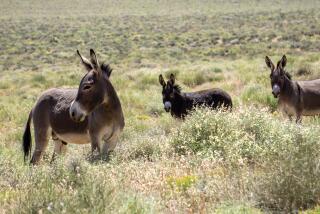Agency, Grower to Help Foxes Outfox Coyotes
- Share via
The U.S. Fish and Wildlife Service and a Central Valley nut grower agreed Monday to an unusual strategy to protect the San Joaquin kit fox, an endangered species.
The deal -- brokered by a national environmental group -- is only the second of its kind in California and is being hailed as a seldom-seen example of cooperation between the state’s agricultural interests and the federal agency.
The deal provides the diminutive fox artificial “escape dens” across the 400 acres of orchards in northwest Kern County owned by the Paramount Farming Co. The small dens are designed to allow the fox to elude coyotes, which are responsible for severely reducing the kit fox population.
The group Environmental Defense helped negotiate a similar agreement in July with a timber company in Humboldt County to preserve the northern spotted owl.
The deal to protect the fox is the first involving a farming operation and only the second in California.
“These agreements are hard to get, and we would hope that this would be a model for California and the Central Valley,” said Jim Nickles, spokesman for the U.S. Fish and Wildlife Service, which administers the Endangered Species Act. “This shows we can work cooperatively with landowners to recover these species.”
Under the act, the discovery of a threatened or endangered species can require landowners to restrict commercial or farming activity.
Environmental Defense devised the safe harbor program to allow landowners to work within the confines of the law while continuing to use their land. In the case of the kit fox, the escape dens don’t interfere with the company’s almond, pistachio or pomegranate orchards.
According to wildlife officials, kit foxes use the farm property as a migration corridor, racing between two open, grassy areas where the animals’ dens are located. Coyotes easily overtake foxes in the orchard, where there are no holes or dens to retreat to.
The San Joaquin kit fox population is down 85% from its height at the start of the 20th century, according to the Fish and Wildlife Service. Coyotes, red foxes and habitat loss are responsible for the decline.
“It would be much better for endangered species and for the environment if we could make the Endangered Species Act a little more friendly to landowners,” said Joseph MacIlvaine, president of Paramount Farming Co.
The safe harbor program began in 1995, but California’s participation has lagged. California is home to more threatened and endangered species than any state except Hawaii.
The kit fox project will be administered by the Endangered Species Recovery Program operated by Cal State Fresno and Cal State Stanislaus.
The fox’s status will be reviewed in three years, Nickles said, and the farm may then choose to discontinue the program.
More to Read
Sign up for Essential California
The most important California stories and recommendations in your inbox every morning.
You may occasionally receive promotional content from the Los Angeles Times.














